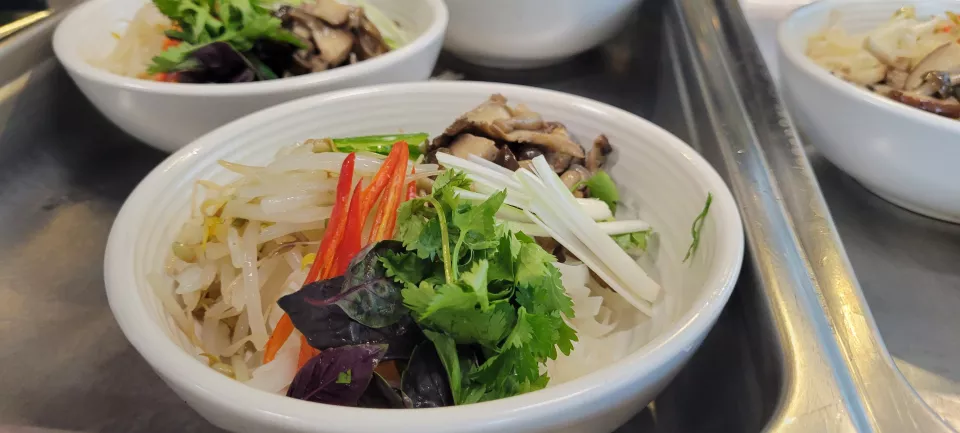Let's Connect
Our friendly and educated team is here to partner with you every step of the way. Connect today to learn of all the ways to partner with The Common Market.
The Good Eating Company chefs visited Ellijay Mushrooms in the mountains of northern Georgia, which led to a particularly memorable chef’s table event.
Delivering local food for the common good.

by D Laninga
These days, more and more companies are pledging to source responsibly by reducing their environmental impact and fostering stronger equity and diversity in their supply chains.
Food service companies, in particular, can achieve these goals thanks to their substantial purchasing power, and in doing so, make significant changes for the better in their local food systems.
However, meeting these commitments can be challenging for large companies with complex procurement platforms. For example, while everyone seems to be talking about regenerative agriculture, it’s hard to know with certainty how much has translated into support for farmers using verified regenerative practices — a concept of Indigenous origin referring to agricultural practices that improve soil health and water infiltration, and infiltration and sequester more carbon. Regenerative agriculture yields long-term benefits to the environment, human health, and society more broadly.
Finding farms and vetting their practices can be daunting, often requiring significant time and resources. And sourcing from numerous smaller farms adds difficulty as it involves coordinating with multiple vendors and ensuring consistent supply.
Still, companies are out there surmounting these challenges and proving it’s possible to achieve sustainability objectives with the right partnerships and strategies.

The Good Eating Company recently joined the sustainability commitment club when its leadership publicized a pledge to spend 15% of their food budgets in support of farms and ranches that embrace regenerative growing practices.
Why would any food service company make a commitment like this? Claire Turner, Director of Sustainability for The Good Eating Company, explains that “a big part of why we made this commitment was to be a market force for regenerative agriculture. We want to propel market movement and be a buyer of regenerative products.”
By pledging a significant portion of its budget to regenerative practices, The Good Eating Company aims to drive demand for sustainably produced food and support the farmers dedicated to these methods.
For The Good Eating Company and its parent company Sodexo, this dedication to sustainable sourcing is about more than just good PR, Claire says sustainability is at the core of their mission — not a side project. Sustainable sourcing is about nurturing our planet's health and fostering resilient local food systems that continue to feed us in the future.
To put it another way: Companies that make these commitments are looking to the future and taking action today.
Partnerships are the key to achieving the desired environmental, sustainability, and governance outcomes. Luckily, The Good Eating Company has partnered with The Common Market, which shares a dedication to equity, sustainability, and regenerative agriculture.
By working with The Common Market, The Good Eating Company’s leadership can trust these core values are not just aspirational words but are being implemented through every step of the procurement process.
The Common Market plays a crucial role in connecting The Good Eating Company to farmers who use the kind of growing practices that align with their mission. Many of these farmers run small operations, and some are just starting out as farmers. Some regenerative farmers who are Black, Indigenous, or People of Color (BIPOC) disproportionately lack access to land, capital, and consistent market opportunities due to a legacy of discrimination at USDA and other institutions.
These farmers would be unlikely to approach Sodexo or The Good Eating Company, says Chef John Kerkeslager, Executive Chef at a Good Eating Company technology client in Atlanta. As a large company with a very detailed procurement platform, The Good Eating Company and its parent Sodexo rely on trusted partners to locate and vet this type of small, diversified farm.
Claire Turner agrees that working with a values-aligned distribution partner is essential to The Good Eating Company, noting her appreciation for the rigor with which The Common Market evaluates farms in its network to ensure that their claims are meaningful and not merely greenwashing.
“We rely on partners like The Common Market to help connect us to the values-aligned farmers who'll help us meet our goals," she says.
“The Common Market is the connection to local. They do the introductions, and have introduced us to cool people who have been friends for years,” says Chef John. "What we do would not be possible without them.”
Founded in a steadfast commitment to values-aligned procurement, The Good Eating Company’s procurement through The Common Market’s network is a proof of concept, demonstrating that there are viable markets for regenerative products. And when everyone — the people who grow and raise the food, the people who distribute the food, and the people who buy the food — shares common values, a food supply chain becomes something greater than the sum of its parts.
“Think of it as an ecosystem,” says Claire, describing a world in which buyers don’t just pay money in exchange for goods but also assume responsibility for “[educating] consumers on the importance of regenerative agriculture, BIPOC growers, and short value chains."
A self-sustaining ecosystem like that not only produces nutritious food to feed communities, but can realize a multitude of benefits for small businesses, public health outcomes, and the environment.
A sustainable ecosystem also provides for the future, thanks partly to an arrangement The Common Market increasingly deploys called a “forward commitment.”
Forward commitments are agreements made by an institution — in this case, by The Good Eating Company — to purchase products from a certain farmer or producer over an extended period, often a growing season or calendar year.
Chef John explains that these agreements are more than just a courtesy to local farmers. "This gives farmers the ability to plan a crop and know it’s sold. It offers them the prospect of residual benefits and economies of scale to start working.”
With an assured buyer for a certain crop, a farmer’s risk drops, potentially freeing them up to expand, diversify, or invest in upgrades. Commitments can help keep them in business.
And as important as they are to the farmers, forward commitments are just as important to buyers with environmental and sustainability goals. By pledging to purchase from local farms that are integral to and interwoven into their communities, The Good Eating Company and The Common Market ensure that there will be local food to buy in the future, contributing to a more resilient and sustainable food system for generations to come.
“The Common Market is the connection to local. They do the introductions, and have introduced us to people who have been friends for years. What we do would not be possible without them.” — Chef John Kerkeslager, Executive Chef, The Good Eating Company, Atlanta

Through its sustainable procurement practices, The Good Eating Company not only meets its sustainability goals but also enhances the quality of its offerings, fosters closer connections with food sources, and inspires culinary innovation.
One of the most immediately obvious benefits of The Good Eating Company's sustainable procurement practices is the consistently higher quality of food. Chef John shares an anecdote about serving kale from Starlit Roots Farm, procured through a forward commitment: "Two people came to me and said they couldn’t get enough of it; people couldn’t stop talking about it. When you get feedback like that, it’s easy to commit." Such positive responses underline the superior taste and freshness possible when you source from nearby farms using sustainable practices.
In the food service industry, large operations often distance institutions from the origins of their ingredients. The Common Market helps The Good Eating Company reconnect with what's important by bringing them as close to the source as possible.
For example, a recent visit to Love is Love Cooperative Farm in Mansfield, Georgia inspired two Good Eating Company chefs to craft a new, exciting menu featuring local regenerative tomatoes and strawberries. The Good Eating Company’s relationships with farms allow them to offer dishes that reflect the care and quality of local produce — and cement their sterling reputation.
Farm visits not only strengthen The Good Eating Company’s connection to local produce but also spark new ideas. For instance, a recent visit to Ellijay Mushrooms in the mountains of northern Georgia led to a particularly memorable chef’s table event. The menu highlighted the farm’s shiitake and oyster mushrooms in standout dishes like mushroom pho, short ribs, and risotto. These relationships provide chefs with unique ingredients and the creative impetus to develop distinctive and memorable dishes.
-
Through their relationships with farms in The Common Market’s network, The Good Eating Company is not only supporting sustainable farming practices but also proving that such commitments are financially viable — not to mention socially and environmentally impactful. These commitments prioritize our future food security and serve as an inspiring example for other institutions looking to align their procurement practices with their environmental, sustainability, and governance goals.
Through their relationships with farms in The Common Market’s network, the Good Eating Company is not only supporting sustainable farming practices but also proving that such commitments are financially viable — not to mention socially and environmentally impactful. Their commitments serve as an inspiring example for other institutions looking to align their procurement practices with their environmental, sustainability, and governance goals.
Our friendly and educated team is here to partner with you every step of the way. Connect today to learn of all the ways to partner with The Common Market.
"The Common Market has been wonderful to work with. Not only is the customer service great but the products are also."
— Derick Smith, Culinary / Culinary Purchaser, Cancer Treatment Centers of America